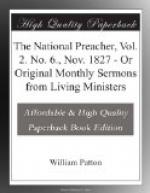These are not mere pictures of the imagination. The realities are at hand. And the influence of cities, in introducing them, must be felt. For “they of the city shall flourish like the grass of the earth.” “The name of the city from that day shall be, The Lord is there.” “Thus saith the Lord of hosts, it shall yet come to pass, that there shall come people, and the inhabitants of many cities; and the inhabitants of one city shall go to another, saying, let us go speedily to pray before the Lord, and to seek the Lord of hosts.” Thus the day shall yet be, when the presence and power of the Holy God in cities shall so absorb the affections, and command the energies of their inhabitants, that, throughout the land, they shall be known and celebrated, not for their wealth, their splendour, their numbers, or their worldly enterprise, but as the places where God has fixed his tabernacle. Yes, the day shall yet come when the intercourse between cities shall be chiefly for purposes of religious improvement—when combinations for political intrigue, or mercantile speculation, which now waken such intensity of interest in our cities, shall dwindle to their comparative nothingness; and when the world’s redemption shall assume its proper magnitude; and all be stimulated to more holy devotedness, and more heavenly effort. Oh, what a day, when all our increasing facilities of intercourse with the land, and with foreign nations, shall be used mainly for advancing that kingdom which consists in righteousness and peace!—when thousands shall prayerfully wait the arrival of every post, and hail the coming in of every vessel, for intelligence, not of this world’s riches and glories, but of the glories and victories of Zion.




